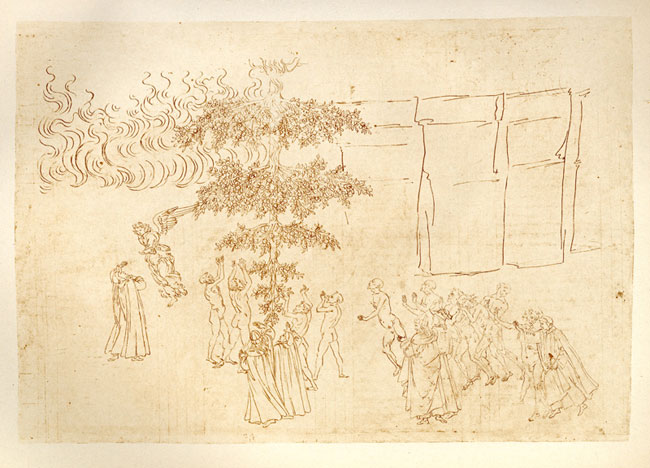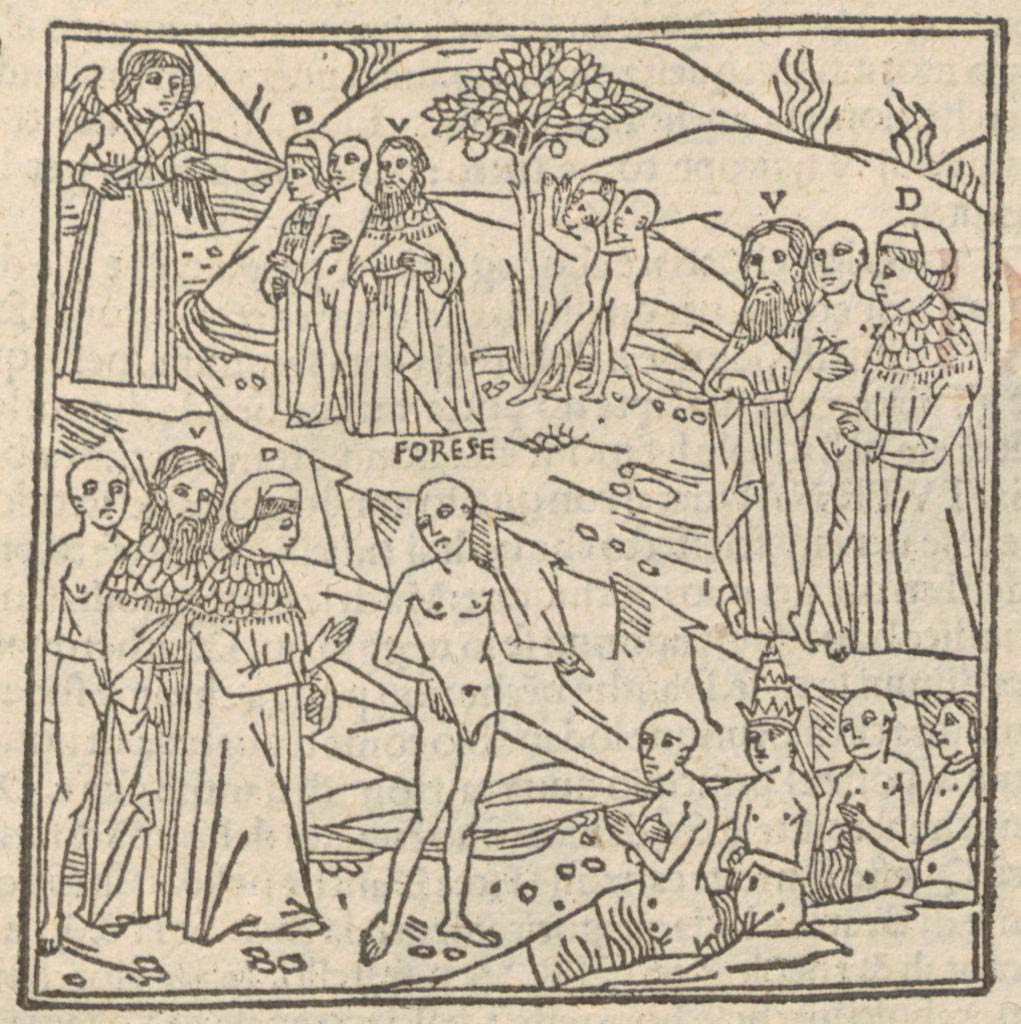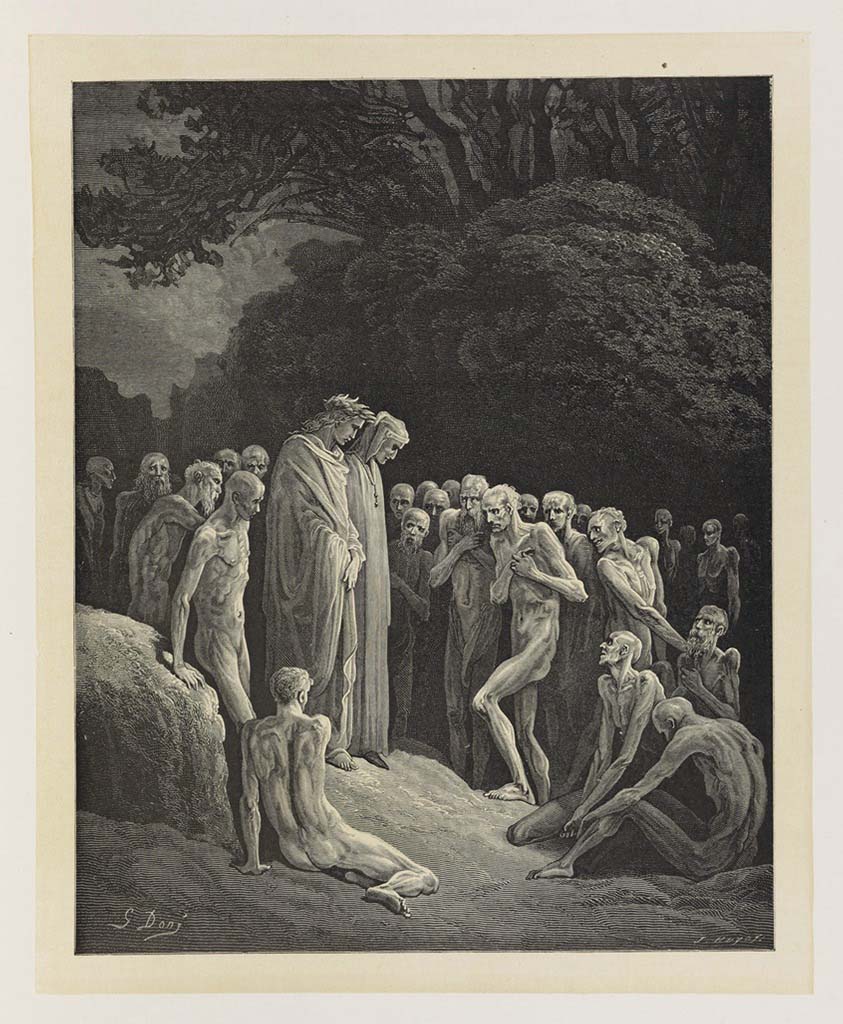While in Canto XXIII we spoke of a “Hungry Heart” and how that applied to curiosity at every level of the Commedia, here we have a glimpse of what I call the ‘Humble-Heart’ of those on this level. Their emaciated countenances are so severe that loved ones would no longer recognize them. Indeed, Dante only knew Forese by the sound of his voice. Each and every person noted by Forese accepted the fact that their faces are unrecognizable and yet, they are willing to be identified. They know their names would be known, not so much for reasons of fame, but infamy due to their gluttony. It is out of humility and acceptance of their need to be redeemed on this level in this particular way that they accept this act of recognition and acknowledgement by Forese.
16 This he said first and then:
Sì disse prima; e poi: "Qui non si vieta
17 'Here it's not forbidden to call us by our names,
di nominar ciascun, da ch'è sì munta
18 since our features are sucked dry by fasting.
nostra sembianza via per la dïeta.
19 'He there'--and he pointed with his finger--'is
"Questi," e mostrò col dito, "è Bonagiunta,
20 Bonagiunta, Bonagiunta of Lucca, and that one
Bonagiunta da Lucca; e quella faccia
21 just beyond him, the face more cracked and scaly
di là da lui più che l'altre trapunta
22 'than the rest, held Holy Church within his arms.
ebbe la Santa Chiesa in le sue braccia:
And he continues by explaining their particular penchant for gluttony and yet there is no self-justification or angry reaction from each soul so identified, as we found in the Inferno. There is a wise, gentle acknowledgement of the facts of a ravaged life that is now, thank God, behind them. One finds a similar wisdom and humble heart in the truly recovered addict who does not deny the damage done to family and loved ones, but is now living each day in thankfulness and one’s own acknowledged need of Grace to make it through this life.
25 He named many another, one by one,
Molti altri mi nomò ad uno ad uno;
26 and each seemed happy to be named--
e del nomar parean tutti contenti,
There is a need to mention briefly the parallel progression of poetry in Dante’s time and the maturing wisdom of Dante the Poet. In his early days his writing focused either on the joys of physical beauty and sexual love, or the bawdy celebration of something along the lines of limericks [“there once was a woman from Nantucket…]. This was a result of the popularity of Petrarch and his celebration of feminine beauty. Beatrice was viewed by Dante at first in this way: adoration from afar due to her beauty. Now, however, due to his growth and maturity not only as an artist, but as a Christian and theologian, he sees Love as part of the fullness of God’s plan and very Being. Dante the Poet is shallow about love at first. One can see that in his fainting reaction to Francesca da Rimini in Inferno Canto V. Now, he is learning to listen to the lessons of Love, from on high, and to write them down.
52 And I to him: 'I am one who, when Love
E io a lui: "I' mi son un che, quando
53 inspires me, take note and, as he dictates
Amor mi spira, noto, e a quel modo
54 deep within me, so I set it forth.'
ch'e' ditta dentro vo significando."
Hollander, Sayers and others believe that this is a statement by Dante the Poet that he is following the guidance of the Holy Spirit, third person of the Trinity, in all that he is writing at this time in the Commedia. That does not mean he doesn’t craft and create profoundly beautiful poetry, but that he is trusting and being guided by his true muse: not Beatrice, but God. [It is significant that Virgil the Poet gives full recognition of this, his true muse, while Virgil and Statius do not even speak in this Canto.]
There are other lovely images and touches of humanity in this Canto, such as the plaintive question by Forese to his dear friend, Dante the Pilgrim “when will I see you again?” or the wheeling of the souls up and away as the cranes do in Egypt. I encourage one and all to find a translation and read each Canto before and after these odd reflections of mine. Toward the end of Canto XIV, we come across yet another tree. The crowd of souls under the branches, which are “weighted down with fruit” raise their hands like little foolish children…
109 who beg, but he from whom they beg does not reply
che pregano, e 'l pregato non risponde,
110 and, to make their longing even stronger,
ma, per fare esser ben la voglia acuta,
111 holds the thing they want aloft and does not hide it.
tien alto lor disio e nol nasconde.
But there is a fine sense of subtlety here, in that the tree, which denies them the fruit they so desire, in fact GIVES them that which they most need: Grace and Redemption. Hence, the souls move on, sated and wiser, having denied their own desires and embraced God’s wishes.
112 Then they went away as if enlightened,
Poi si partì sì come ricreduta;
113 and it was our turn to approach the lofty tree
e noi venimmo al grande arbore adesso,
114 that turns away so many prayers and tears.
che tanti prieghi e lagrime rifiuta.
Apparently this is a shoot from the original tree from which Eve first plucked the fruit, obeying her human desires and denying God’s wishes. Ultimately, Dante the Pilgrim learns the same lesson from this tree as do the souls on this level, that one’s will must be aligned with God’s rather than allowing one’s own self-referent wishes to control one’s life. They leave the tree, hearing the examples of past gluttony, reflective and repentant; “each of us silent, deep in his thoughts,” and they come upon the Angel of Temperance, fiery and beautiful. He tells them which path to take, and combined with these recent examples, not only from the tree and the souls he’s met, but the blinding beauty of the angel, Dante the Pilgrim is fully guided by them alone, and not his own will:
142 His shining face had blinded me,
L'aspetto suo m'avea la vista tolta;
143 so that I turned and walked behind my teachers
per ch'io mi volsi dietro a' miei dottori,
144 like someone led by only what he hears.
com' om che va secondo ch'elli ascolta.
As a result the next ‘P’ is erased from Dante the Pilgrim’s forehead.



 RSS Feed
RSS Feed
